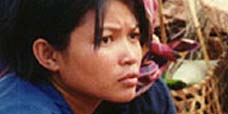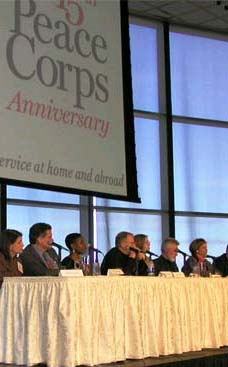
"She rolled her eyes from the weight of the load and planted her hands on her hips, which were wrapped in a wildly colored bolt of cloth depicting cellular phones. The cloth was a pagne celebrating the arrival of Nokia to our stretch of West Africa two weeks ago, and many women in Séguéla were wearing them, were tying their infants snugly onto their backs with them. Coups and guinea worm and female circumcision and HIV and mass graves in Abidjan full of the Muslim north's political youth and the women had turned traditional dances all night around bonfires to celebrate the arrival of the cell phone. This was what West Africa was about: priorities."
An excerpt from "Whiteman" by Ivory Coast RPCV Tony D'Souza
'Whiteman'
By TONY D'SOUZA
Published: April 16, 2006
At nine a.m., the doorbell rang. I couldn't see who it was because of the high wall surrounding the house, but after a moment's debate whether I shouldn't just ignore it, I picked up the crowbar we'd been keeping handy and started across the courtyard to the security door. I'd talked with the girls about getting a gun in the black market, but we hadn't gone that far yet. "Jack's a man. He'll protect us," Samantha had winked and said, and I'd shaken my head and told them, "Then consider yourselves dead already." Because while I didn't like to think of myself as a coward, my first impulse on hearing gunfire was to hit the floor and crawl under something. At the door, I raised the crowbar like a baseball bat. I'd never swung a weapon at anyone, didn't know if I could now, but I held it like that anyway. "C'est qui?" I shouted, trying to sound larger and more menacing than I really was.
"Adama, restes tranquille," a woman's voice called to me. "C'est Méité Fanta, ta voisine."
I quickly turned the lock and pushed open the door onto Ama Méité, a weathered old woman with a steel tub on her head, the heads of the fish in it peeking down at us like children eavesdropping on adults. She also had a stick poking out of the corner of her mouth, an extra-large toothpick. Ama Méité was grandmother to the rabble of naked children who played dust-raising ragball on our street in Séguéla, hollering all day like they owned the place, which they did, and who had brought us water, bucket-by-paid-for-bucket, from their well during the last coup when the water and electricity had been cut in the city. Méité's face did not change when she saw the crowbar in my hand. She went on chewing her stick, the local version of a toothbrush, as though it were a carrot, or a tasty piece of licorice. But I knew from experience that it wasn't tasty at all, that it was infused with a bitter oil as succulent as varnish. People were like that here.
We quickly went through the morning salutations in Worodougou, a cultural requirement you couldn't ignore in the biggest of rushes, even if, say, you felt like the world was ending.
"Manisogoma," I said, lowering my eyes in respect. 'Good morning, respected mother.'
"Say va! Ah see la," Ama Méité said like shouting, which was how it was done. 'Thank you, respected sir. Did the night pass well?'
"Em'ba, Ama," I said. 'Thank you, respected mother, yes.'
"Allah bis sonya!" 'God bless your morning.'
"Amina, Ma." 'Amen, Mother.'
"Allah kenna ahdi." 'God grant you beautiful health.'
"Amina, Ma," I said, touching my hand to my forehead as if bowing in thanks and deference to her benedictions.
"Allah ee balo," she said. 'God grant you a wonderful youth.'
"Amina, Ma."
"Allah bato luma." 'God nourish your home and family.'
"Amina, Ma."
"Allah bo numa." 'God bless all that you do.'
"Amina, Ma," I said louder than before, indicating in their way that I'd received all the benedictions I could bear. "Iniché, iniché. Allah ee braghee." 'Amen, Mother. Thank you, thank you. God bless you in thanks for your benedictions over me.'
"Amina, Va!" 'Amen, sir.'
"Allah den balo, Ma." 'God bless and protect your children, Mother.'
"Amina, Va!"
"Allah kenna ahdi." 'God grant you beautiful health.'
"Amina, Va!"
"Allah sosay djanna." 'God grant you long life.'
"Amina, Va!"
"Allah bis sonya." 'God bless your morning.'
"Amina, Va! Iniché. Adama Diomandé." 'Amen and thank you, respected Adama Diomandé.'
Then we were done with that and Ama Méité said to me, "Bon," flatly in French because we could now get on with our lives. I could already feel the sweat starting to stand out on my forehead, and the fish in the tub on Méité's head seemed to me to be wilting in the sun now, hanging over the rim like the melting watches in the Dalí painting. She rolled her eyes from the weight of the load and planted her hands on her hips, which were wrapped in a wildly colored bolt of cloth depicting cellular phones. The cloth was a pagne celebrating the arrival of Nokia to our stretch of West Africa two weeks ago, and many women in Séguéla were wearing them, were tying their infants snugly onto their backs with them. Coups and guinea worm and female circumcision and HIV and mass graves in Abidjan full of the Muslim north's political youth and the women had turned traditional dances all night around bonfires to celebrate the arrival of the cell phone. This was what West Africa was about: priorities. "So you already know about the coup," Ama Méité chewed on her bitter stick and said.
"Know about the coup?" I said. "All I know is that I got up this morning and turned on the radio and there wasn't any radio."
"Oui," she said, "so you know about the coup. But what are you going to do with that stick? When the bandits come, they will have guns. Therefore, you should buy a gun. A rich man like you, Adama, with so many wives-"
"They're not my wives!" I started, like a thousand times before. "They're my colleagues. I work with them. Nothing else."
"If they're not your wives, oh, then why won't you marry my daughter Nochia, oh?" she sang in French to embarrass me. "She knows how to cook and likes to work in the fields. If you know how to do anything, she'll give you many healthy children, maybe even twins. And even if you don't know how to do those things, she will teach you. Like that you will be rich in America and make your mother proud. Then you will bring us health and happiness and, of course, many gifts, oh, when you come and visit. Anyway," she said, spitting wads of mulled wood on the ground between us like hay, "you should buy a gun. My son knows a man who can sell you a strong gun washed with good magic."
"We are a humanitarian organization, Ama," I said lamely. "We don't believe in guns."
And she said, "In all the films from America, all is guns. So don't tell me! What I've come to say is this: Don't open the door today, Adama Diomandé. There are many looters and bandits. They will come and rob you. Everybody knows whites live in this house. And who knows what riches you have in there, anyway? So do not open the door. Now I have to go to market and sell these fish. They don't care if there's a coup or not. All they care is that they want to stink soon."
"Thank you, Ama," I said as she turned to walk back to her compound, where the children were kicking a soccer ball that was really half of a coconut shell, were playing hopscotch in the dirt and clapping and singing like it was the best day ever, like always. She waved her hand back at me and said, "You whites are bizarre, oh! Going to chase away bandits with a stick, Allah!"
I could not remember if this was the third coup or the fourth in the two months since I'd arrived up north, and anyway, talk of coups was a very complex thing because you had bloody coups and bloodless coups and attempted coups and aborted coups and averted coups and rumored coups and the coups that happen that nobody knows about except you go to the post office one day to mail a letter to your retired mother in Florida to say everything's getting all blown out of proportion in the Western media and there's a new general-president smiling at you from the stamp like somebody who's gotten away with something big, and also there were the couvre-feus, which is pronounced somewhat like "coup" but means you can't go out at night or you'll be shot, which should not be confused with coups de grâce, which is how chickens were killed for dinner. All of this is to say that every three weeks the country was erupting into general mayhem from the capital to Korhogo, producing very little change except for a mounting body count and the ulcers growing in my stomach. Oh yes, there was also the matter of a few towns in the far north like Kong and Tengréla that had declared themselves independent states and were being deprived of all services by Abidjan in an apparent attempt to siege them into submission. There was also the small matter of the new guns the traditional hunters and witch doctors were showing off in the villages, shiny AKs that they said came from Mecca, and other small matters such as the Christian military kicking in people's doors like storm troopers and beating old women, and the list could go on for a very long time, but after I locked the door behind Ama Méité, I went inside to call the Potable Water International office in Abidjan-my organization-for an update and found that the line had been cut, which wasn't reassuring. Then I sat on the couch and fiddled with the shortwave's antenna. Just as I was able-with many strange maneuvers of my arms like a semaphore-to draw in the BBC, where the female announcer was calmly saying in her lovely British voice, "... rebel forces in the Ivory Coast ...," all the power was cut and then I was suddenly very alone in a dark and quiet house in what the U.S. embassy security officer had referred to just weeks before as "the most unstable city in the country." I switched the shortwave over to its batteries. Of course nothing happened. I turned the radio over. The cover to the battery compartment was missing, and so were the batteries. One of the girls knew where they were no doubt, as one of them was out in the bush right now, humming softly as she dug a new latrine, working to the music playing from her battery-powered Walkman. . . .
Excerpted from Whiteman by Tony D'Souza Copyright © 2006 by Tony D'Souza. Excerpted by permission.
All rights reserved. No part of this excerpt may be reproduced or reprinted without permission in writing from the publisher.
Excerpts are provided by Dial-A-Book Inc. solely for the personal use of visitors to this web site.


















